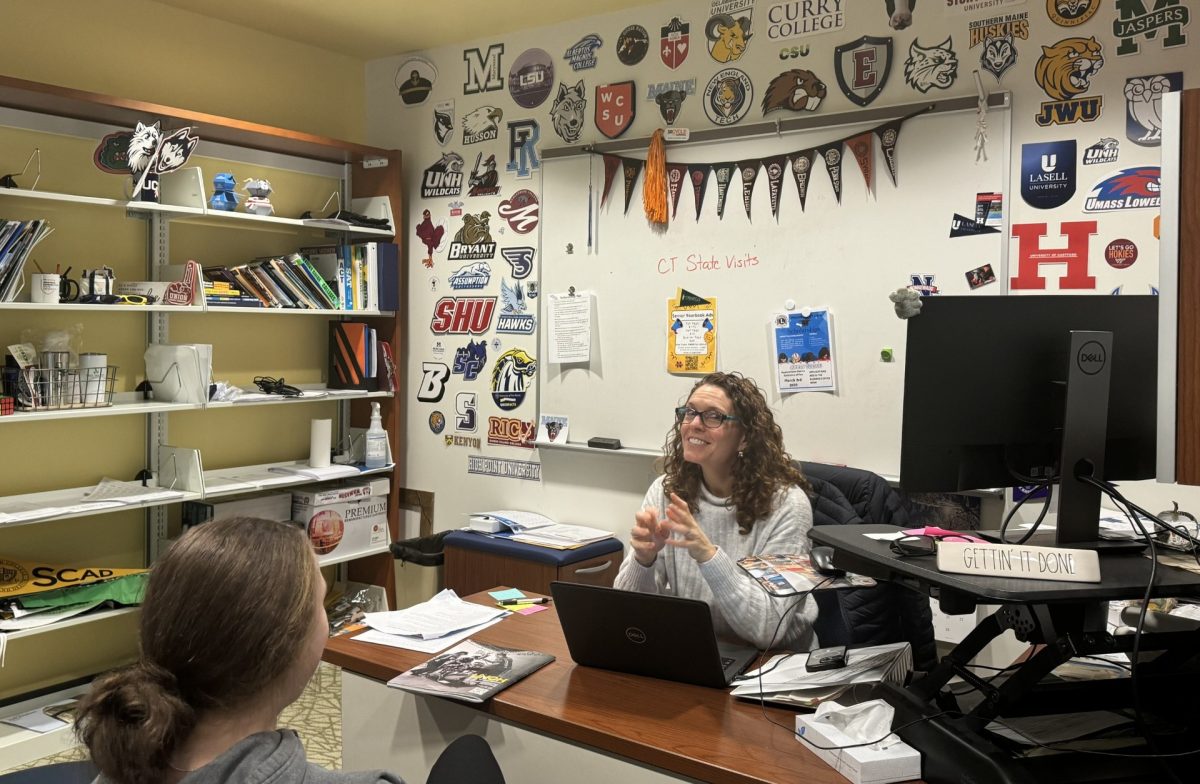WOODBURY — Racing heart. Dry mouth. Shaky hands. These are symptoms that students walking into an AP exam room are all too familiar with.
Next comes the dread of listening to the proctor debrief everyone about the mental battle they are about to engage in. Upon hearing the words “you may begin,” neurons start firing like muskets in hopes of defeating the enemies on their paper. In as little as the first 30 minutes, the exhaustion in the air is suffocatingly palpable.
But finally, there are no more fields to fill, and the test comes to a close.
Exams administered by College Board, including AP tests or the SAT, are challenging by design. But there is more behind the organization that creates skepticism and resentment in the vast majority of students.
For example, many students, including AP student Mason Norris, take issue with the fact that College Board is labeled as a non-profit organization even though they charge students to take their tests.
“I think it’s comedic … I understand ‘non-profit’ doesn’t necessarily mean people don’t get paid, but them parading the idea has a connotation,” Norris says. “They make it seem like it’s for the good of the kids, but they’re really just a greedy corporation like everyone else. They’re the same as a Google or an Apple to me.”
Fellow AP student Judy Nakhla notes that College Board seems deceptive not only with their true profit, but with the questions on their tests as well.
“It definitely feels like, at moments, they’re trying to catch you,” says Nakhla, “especially when I learned there were questions on the APUSH [U.S. History] exam where the answer choices could involve made-up historical moments. That was weird to me because, I get that you should know the right answer anyway, but it doesn’t feel very honest.”
Besides their underhanded behavior, College Board is also unpopular among students because the benefits they provide are constantly brought into question.
“There is a sense of false advertising that goes on because colleges aren’t required to take your AP scores,” Norris says. “It’s implied that if you get a 4 or 5, you get college credit, but that’s not always true. … I think that College Board doesn’t want you to know all the extra bits of information, because in the end, they do detract from how helpful it really can be.”
“I would say it’s not beneficial in general to feel like everything you’re working towards throughout the year is going to amount to a single test,” Nakhla adds. “Sometimes I felt like I was taking certain classes or studying really hard for the SAT because I had to. … I would be a lot less stressed in a world where certain AP scores or SAT scores didn’t make or break what colleges think of you.”
For these reasons, College Board has generally become an object of high school students’ hatred. However, College and Career Resource Center counselor Kathy Green notices that there has been a shift in how critical their exams are to students.
“Schools’ test-optional policies really reached maximum capacity during COVID because the SAT was unavailable for students,” Green says. “Many colleges realized the applicant pool was just as strong without the SAT.”
The majority of colleges in the country have maintained their test-optional policies since the pandemic, relieving pressure for students who prefer not to have their SAT score considered as a factor in admission.
Students are not only freed from the SAT score requirement, but are also presented with a different avenue to earn college credit that does not involve taking an AP class at all: ECE classes.
“ECE is ‘Early College Experience,’ or dual enrollment,” Green says. “It means you are not only earning high school credit, but you are additionally earning college credit from the institution in which the class is being offered.”
The existence of ECE makes it so that students can take a class from an existing college rather than one created by the College Board. AP Lit teacher and College Board grader Conor Gereg, whose class is also offered in the ECE format, further explains the major differences between the two types of classes.
“ECE courses offer students a full year to display their abilities while, unfortunately, AP exams capture a three-hour window that’s a mere snapshot of students’ skills,” Gereg says. “These high-pressure exams condensed over a few hours aren’t always reflective of the skills students have built over the course of the year.”
“I know for some students, AP can be a little too daunting, but ECE feels a little more closely built into a regular class,” Nakhla observes.
However, despite the greater flexibility of ECE and the unfavorable aspects of College Board, students and teachers alike still acknowledge the better qualities of the organization.
“For two years of my high school experience, I took exclusively AP classes, so it was very all-encompassing. It’s a lot of work. That being said, I never felt that any single AP class was too much work,” Norris says. “I wouldn’t recommend that someone do exclusively APs, but I think the workload per each class is doable.”
Gereg, who has served for five years as an AP Lit exam reader, can also attest to the fairness of the grading process.
“The amount of calibrating and conferencing readers do is something AP takes very seriously,” Gereg said. “Their process ensures that, regardless of who the reader is, students are given fair and accurate scores that are rooted in a scoring rubric that’s transparent and connected to the course.”
“Outside of testing and AP courses, their website is very large and features things like opportunities to connect to colleges or scholarships, so they’re not completely ‘anti-student,’” Nakhla adds.
Ultimately, while many students and teachers are allied in their criticism of College Board, they also recognize its usefulness in the high school experience.
“I still see value in taking the SAT twice or three times because there are still some schools that require the test score,” Green notes. “In terms of AP testing, it allows students to get through college courses at a faster rate and mitigate some of the cost. Some schools also do prefer AP over ECE.”
“With the cost of college being what it is, this opportunity isn’t just intellectually and academically enriching, it’s a financial godsend,” Gereg concurs.
Regarding money loans for students, Green adds that the CSS Profile, College Board’s own financial aid form, potentially outshines its federal counterpart.
“Even the CSS Profile provides a more in-depth picture of a family’s finances as compared to the FAFSA,” Green says.
“Having a high SAT, having those AP scores on your college resume, no matter what, will improve your position,” Norris says. “So if someone knows they’re capable of keeping up, they should take an AP class.”











